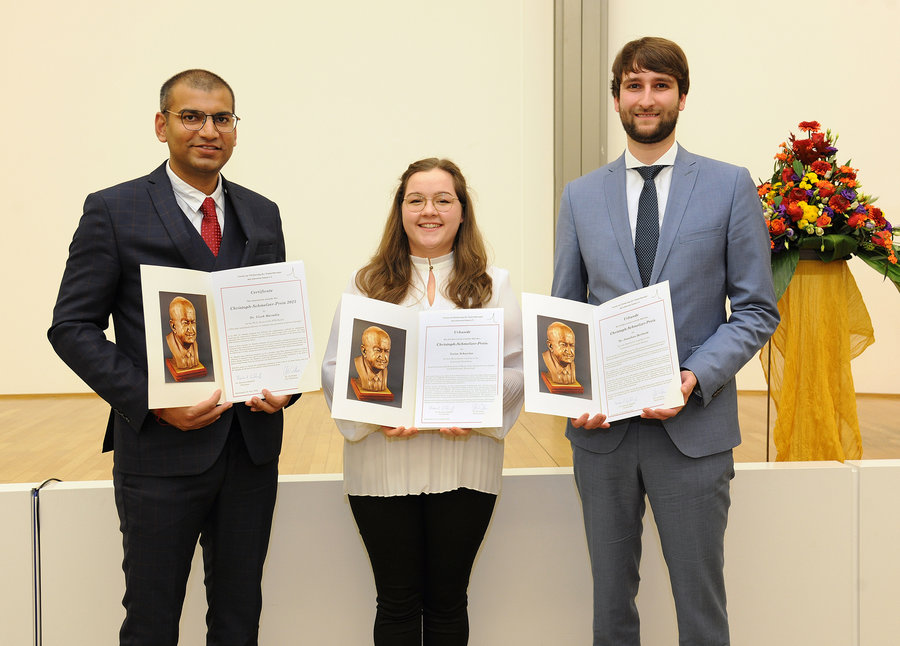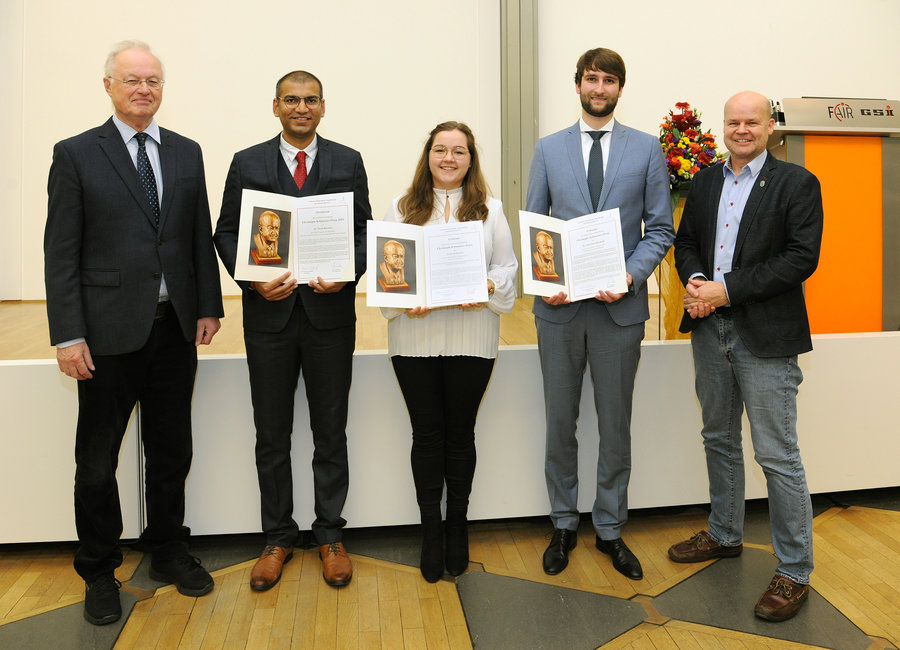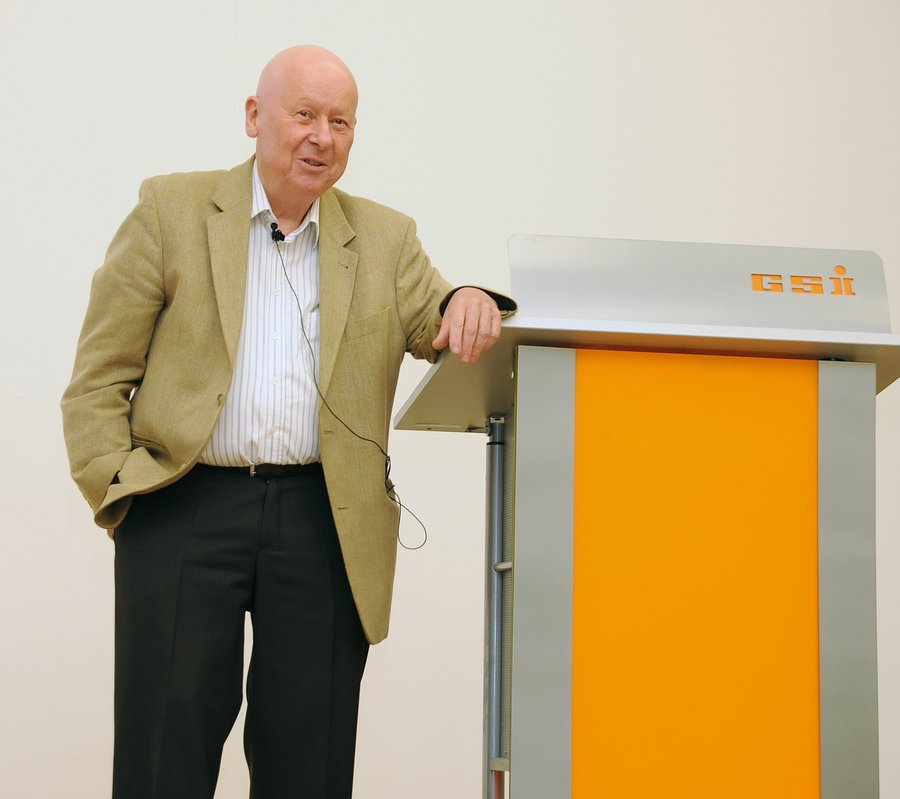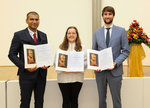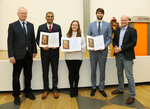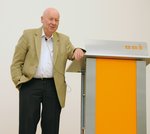Memorial colloquium and award ceremony: Honoring the memory of Professor Gerhard Kraft - Three young researchers receive the Christoph Schmelzer Prize
21.11.2023 |
It was both a tribute to an exceptional lifetime achievement and an encouragement for the next generation of scientists: With a solemn memorial colloquium held at the GSI/FAIR campus in Darmstadt, the GSI Biophysics department paid homage to biophysics Professor Gerhard Kraft, who passed away in March 2023. This event was combined with the annual awarding of the Christoph Schmelzer Prize to three young scientists. The prize was awarded to Dr. Jonathan Berthold from the Technical University of Dresden and Dr. Vivek Maradia from ETH Zurich for their doctoral theses, and to Luisa Schweins from the University of Heidelberg for her master's thesis.
The memorial colloquium on November 20, 2023 once again honored the important scientific legacy of Professor Gerhard Kraft, the biophysicist and pioneer of modern heavy ion therapy. The initiator and decisive innovator of tumor therapy with ion beams established the biophysical research department at GSI in the early 10980s, which he headed from 1981 to 2008. For his exceptional merits, especially in cancer research and particle therapy, this world-renowned researcher received numerous high-ranking national and international awards and honors. He passed away on March 18, 2023. The memorial event was organized by the GSI Biophysics Department, the Department that he founded and was previous director, and was attended by many colleagues all over the world and by Professor Kraft’s family. His wife, Wilma Kraft-Weyrather, worked for many years with the husband at GSI and has largely contributed to the success of the therapy project.
The special colloquium was opened by the GSI/FAIR Scientific Managing Director, Professor Paolo Giubellino, and the current Director of the Biophysics Department and successor of Gerhard Kraft, Professor Marco Durante. “Gerhard Kraft – said Durante – was a pioneer and a visionary. His work has contributed to save many lives and to make the name GSI famous worldwide”. Professor Paolo Giubellino emphasized: “Gerhard Kraft was an outstanding scientist who was highly renowned nationally and internationally and played a decisive role in shaping the scientific reputation of GSI and FAIR. His research is of high relevance for society".
Professor Jürgen Debus from the University of Heidelberg delivered the memorial lecture. Subsequently, colleagues and fellow researchers had the opportunity to share their memories of Professor Gerhard Kraft through short talks. The speakers emphasized his importance as an outstanding person and professional.
After the lunch break, the event continued with the presentation of the Christoph Schmelzer Prize, which is awarded annually by the Association for the Promotion of Heavy Ion Tumor Therapy. This would have been in line with Professor Kraft's wishes, as he dedicated himself tirelessly to the education of young scientists and mentored significantly more than a hundred final theses. The awarding of the Schmelzer Prize was an important issue for him every year. The last public talk of Professor Kraft was indeed given at the 2022 Schmelzer Prize ceremony.
Following a welcome address by Dr. Hartmut Eickhoff, chairman of the board of the association, Professor Marco Durante gave the word of greeting on the occasion of the 25th Christoph Schmelzer Prize. As an internationally recognized expert in the fields of radiation biology and medical physics, he had recently dedicated the Henry Kaplan Prize, awarded to him, to Professor Gerhard Kraft. The Kaplan award is considered the top radiation research award.
With the Christoph Schmelzer Prize, the Association for the Promotion of Tumor Therapy with heavy ions, honors outstanding master's and doctoral theses in the field of tumor therapy with ion beams. Dr. Jonathan Berthold's receives the prize for his thesis entitled "Evaluation of a detector system for prompt gamma radiation for treatment monitoring in clinical proton therapy". In his thesis, he deals with the use of gamma radiation, which is generated by the interaction of proton beams with the irradiated tissue, to verify the spatial distribution of the dose.
For his dissertation entitled "Ultra-fast treatment delivery to enhance the potential of proton therapy", Dr Vivek Maradia focused on accelerator optimization, which enabled a significant increase in beam intensity. This allows a substantial reduction in irradiation time, which is particularly relevant for the improved treatment of moving tumours.
Luisa Schweins receives the prize for her Master's thesis entitled "Implementation and Evaluation of Monte Carlo Simulations for Carbon-Ion Radiotherapy Monitoring". She worked on the simulation of a new type of detector system for monitoring radiation application and validated these simulations using experimental studies.
The prize money for the dissertations is 1500 Euro each, for master's theses 750 Euro. The award is named after Professor Christoph Schmelzer, the co-founder and first Scientific Managing Director of GSI. The promotion of young scientists in the field of tumor therapy with ion beams has been continuing for many years, and the award was presented for the 25th time. The topics of the award-winning theses are of fundamental importance for the further development of ion beam therapy and often find their way into clinical application. (BP)
About the Association
The Association for the Promotion of Tumor Therapy supports research activities in the field of tumor therapy with heavy ions with the aim of improving the treatment of tumors and making it available to general patient care. At the accelerator facility at GSI, more than 400 patients with tumors in the head and neck area were treated with ion beams as part of a pilot project from 1997 to 2008. The cure rates of this method are sometimes over 90 percent and the side effects are very low. The success of the pilot project led to the establishment of clinical ion beam therapy centers in Heidelberg and Marburg, where patients are now regularly treated with heavy ions.
Further Information
Association for the Promotion of Tumor Therapy with Heavy Ions e.V.
Technical University of Dresden




